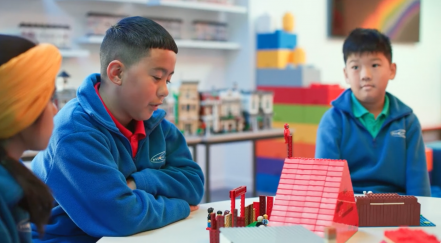Assessment and monitoring using a team approach
Form a team, collaborate and gather evidence to understand your learners and their needs.
On this page:
On this page:
Current page section: Assessment and monitoring
Go to top of current page: Assessment and monitoring
Go to top of current page: Assessment and monitoring
Go to top of current page: Assessment and monitoring
Establish a team
Establish a team
Take a team approach to providing responsive support.
- Be guided by ākonga and their whānau.
- Involve your learning support coordinator or RTLB.
- Identify and connect with colleagues who have relevant past experience.
- Consider connecting to external expertise or agencies.
Take an inquiry approach
Take an inquiry approach
Develop a responsive evidenced-based process of working together that supports learner self-advocacy.
- Support the ākonga and whānau to lead and guide the conversation.
- Work collaboratively to identify key learning goals, responsibilities and what success would look like.
- Share concerns, questions, and ideas.
- Consider ākonga strengths as well as barriers to learning.
- Identify how solutions or strategies will be implemented, refined and reviewed.
- Discuss how to assess learning in ways that work for ākonga.
- Agree on how to stay in touch and share information.
Innovate with assessment methods
Innovate with assessment methods
Inclusive assessment means personalising assessments by integrating multimedia options and assistive technologies. Ākonga can express their learning through videos, podcasts, or visual presentations, and utilise tools like speech-to-text software, catering to diverse learning preferences and needs.
Innovative assessment might involve:
- cross-curricular situations, for example an assessment combining maths and social studies
- project-based learning where learners solve a problem through a project
- personalised assessment in a context chosen by the learner
- multimedia and Assistive Technology integration.

Narrative Assessments for Inclusive Practice
A research initiative involving secondary schools and special education providers implemented narrative assessments to document and support the learning of learners working at Level 1 of the New Zealand Curriculum. By capturing learners' learning experiences through narratives, photos, and videos, teachers could better recognise and respond to individual learning needs, fostering more inclusive teaching practices.
Share information using digital tools
Share information using digital tools
John Robinson reflects on the value of sharing information using the school SMS and learner e-portfolios.
Understand the effects of medication
Understand the effects of medication
The use of medication for ADHD can be a sensitive issue.
Understand possible side effects so you know when to alert parents.
Medication may at times need to be reviewed.
Medication can:
- decrease impulsivity, task jumping, and aggressiveness
- increase compliance
- improve handwriting and fine motor skills, social relationships, and short-term memory.
Medication won’t:
- increase intelligence
- improve reading unless attention is the major issue
- change a child’s personality
- cause drug dependency.
Side effects:
- loss of appetite/mild weight loss
- insomnia
- tearfulness, being withdrawn or clingy (these could be signs that medication needs adjusting)
- rebound behaviour – discuss with professionals.
Useful Resources
Useful Resources

Using narrative assessment to support secondary school teachers’ inclusive practices
This study shows how narrative assessment can be used to support inclusive practices.
Publisher: Teaching and Learning Research Initiative
Next steps
More suggestions for implementing the strategy “Identify needs and how to provide support”:
-
Current page Assessment and monitoring
Return to the guide “ADHD and learning”
![11435 [ADHD-and-learning.jpg]](https://inclusive-live-storagestack-assetstorages3bucket-3uty0hejzw6u.s3.ap-southeast-2.amazonaws.com/public/inclusive-education/guides/featured-images/ADHD-and-learning__FillWzEwNCwxMDRd.jpg)
How to use this site
Guide to Index of the guide: ADHD and learning
Understand:
Strategies for action:
-
Identify needs and how to provide supportShow suggestions for Identify needs and how to provide support
- Ask the student what will help
- Partner with whānau
- Assessment and monitoring
- Organisations, programmes and resources
-
Support self-regulation and positive behaviourShow suggestions for Support self-regulation and positive behaviour
-
Helpful classroom strategies years 1-8Show suggestions for Helpful classroom strategies years 1-8
-
Helpful classroom strategies years 9-13Show suggestions for Helpful classroom strategies years 9-13
